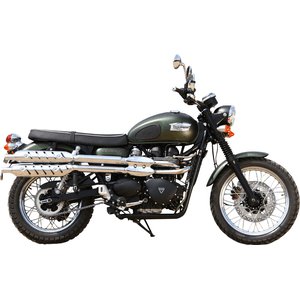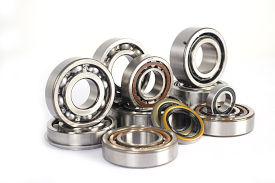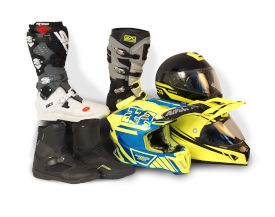Triumph Scrambler 865 (2008–2016): A Timeless Dance Between Heritage and Dirt
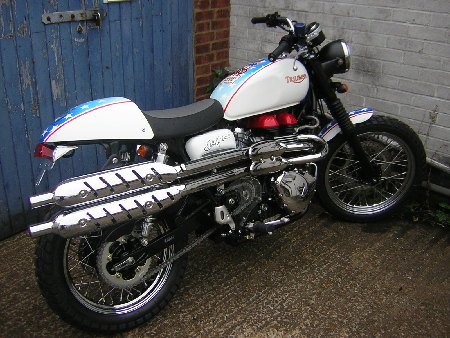
Introduction
The Triumph Scrambler 865 isn’t just a motorcycle—it’s a time capsule with knobby tires. Born from Triumph’s rich off-road legacy and styled to evoke the golden era of 1960s desert sleds, this modern-classic hybrid has carved its niche as a machine that thrives equally on cobblestone streets and gravel backroads. From 2008 to 2016, the Scrambler 865 remained a steadfast tribute to simplicity, offering riders a raw, unapologetic experience in an increasingly digital world. After a day in the saddle, one thing becomes clear: This bike isn’t trying to win spec sheet battles. It’s here to win hearts.
Design: Retro Charm with a Side of Grit
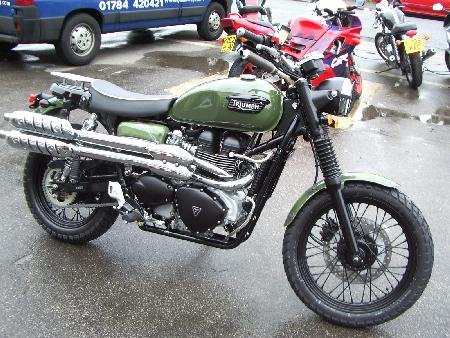
The Scrambler 865’s design is a masterclass in nostalgia engineering. The high-mounted twin exhausts—stainless steel headers capped with chrome silencers—aren’t just for show. They’re a functional nod to the bike’s off-road intentions, lifted clear of rocks and ruts. The 19-inch front wheel wrapped in a chunky 100/90 tire gives it a commanding stance, while the ribbed seat (825 mm / 32.5 inches tall) strikes a balance between café racer crouch and dirt bike practicality.
Color schemes evolved subtly over the years, ranging from understated Jet Black to adventurous Matt Pacific Blue and Diablo Red/Lunar Silver. The 2010s saw matte finishes gain prominence, reflecting the era’s shift toward understated sophistication. Special editions like the Evel Knievel Tribute (featuring a Thruxton seat, red cam covers, and Caesar’s Palace-worthy graphics) proved the Scrambler’s custom canvas potential.
Engine and Performance: Air-Cooled Soul
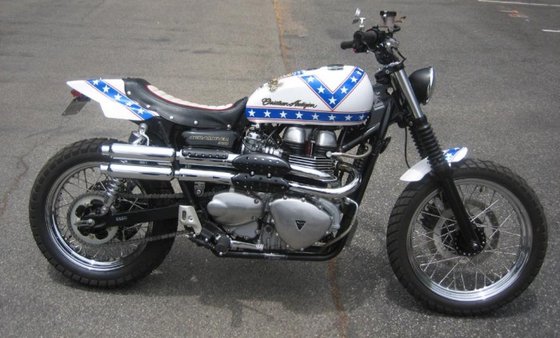
At the heart beats Triumph’s 865cc parallel twin, an air-cooled relic in an age of liquid dominance. With 59 HP (43 kW) at 6,800 RPM and 68 Nm (50.2 lb-ft) of torque peaking at 4,750 RPM, this isn’t a motor that rewards redline heroics. Instead, it’s all about mid-range punch—perfect for lofting the front wheel over trail obstacles or surging through city traffic.
The 270-degree crankshaft ensures a throaty, uneven exhaust note that’s more blues riff than symphony. Coupled with carburetors (early models) or sequential fuel injection (post-2010), the engine delivers a tactile experience missing from modern ride-by-wire setups. At highway speeds (100-120 km/h or 62-75 mph), vibrations seep through the bars, a friendly reminder that this isn’t a sterile commuter. Fuel efficiency hovers around 5.1 L/100 km (46 mpg), making it frugal enough for all-day adventures.
Handling: Unplugged and Unpretentious
The Scrambler’s tubular steel cradle frame and 1500 mm (59.1-inch) wheelbase prioritize stability over flickability. On pavement, the 41mm KYB forks and twin rear shocks (with adjustable preload) handle bumps with old-school firmness. Venture off-road, and the 120mm/106mm suspension travel (front/rear) reveals its limits—this isn’t a Dakar racer, but it’ll handle fire roads with composed enthusiasm.
Brembo’s absence is felt in the braking department. Single 255mm discs with Nissin 2-piston calipers provide adequate stopping power, though riders used to radial masters might crave more bite. The spoked wheels (19-inch front/17-inch rear) shod in dual-purpose tires strike a compromise, howling mildly when pushed hard on asphalt.
Competition: How It Stacks Up
In the neo-retro scrambler arena, the Triumph faced fierce rivals:
- Ducati Scrambler Icon (2015+): Lighter (186 kg / 410 lbs) and peppier (75 HP), the Ducati leans modern. But it lacks the Triumph’s analog charm and historical authenticity.
- Yamaha SCR950 (2016–2018): A V-twin brute with cruiser DNA, the Yamaha’s 942cc engine delivers stump-pulling torque but feels portly at 252 kg (555 lbs).
- Moto Guzzi V7 Stone: Shaft-driven and quirky, the Guzzi appeals to niche enthusiasts but can’t match the Triumph’s aftermarket support or off-road pretensions.
The Scrambler 865’s ace? Balance. It’s neither too vintage to be impractical nor too modern to lose its soul.
Maintenance: Keeping the Legend Alive
Ownership is straightforward but requires vigilance:
- Valve Clearances: Check every 16,000 km (10,000 miles). Intake: 0.15–0.20 mm (0.006–0.008 in), Exhaust: 0.25–0.30 mm (0.010–0.012 in). Consider a shim kit from MOTOPARTS.store for hassle-free adjustments.
- Chain Care: The 104-link X-ring chain demands regular lubrication. Upgrade to a premium DID chain for extended durability.
- Oil Changes: Use SAE 10W-40/10W-50 (3.8L with filter). Synthetic blends recommended for frequent riders.
- Tire Pressure: 2.1 bar (30 psi) front / 2.3 bar (33 psi) rear. Swap to Heidenau K60 Scouts for serious off-roading.
- Carburetor TLC (2008–2009 models): Annual cleaning prevents ethanol-related issues.
Pro Tip: The air-cooled engine runs hot in traffic. MOTOPARTS.store’s oil cooler kit can help manage temperatures during summer rides.
Conclusion: More Than a Poseur
The Triumph Scrambler 865 isn’t perfect. It’s heavy, vibrates like a paint mixer, and won’t win drag races. But perfection is boring. This bike thrives in the moments between point A and B—where gravel pings off the exhaust, the front wheel skims over washboard ruts, and the analog thump of its engine becomes your heartbeat. It’s a machine that begs to be modified, ridden hard, and cherished like a leather jacket that only gets better with scars. At MOTOPARTS.store, we’re here to fuel those adventures, one retro-futuristic upgrade at a time.
Specifications sheet
| Engine | |
|---|---|
| Stroke: | Four-stroke |
| Max power: | 59 kW | 79.0 hp |
| Max torque: | 68 Nm |
| Fuel system: | Multipoint sequential electronic fuel injection with SAI |
| Max power @: | 6800 rpm |
| Displacement: | 865 ccm |
| Max torque @: | 4750 rpm |
| Bore x stroke: | 90.0 x 68.0 mm (3.5 x 2.7 in) |
| Configuration: | Inline |
| Cooling system: | Air |
| Firing interval: | 270 degrees |
| Compression ratio: | 9.2:1 |
| Number of cylinders: | 2 |
| Dimensions | |
|---|---|
| Wheelbase: | 1500 mm (59.1 in) |
| Dry weight: | 214 |
| Wet weight: | 230 |
| Seat height: | 825 mm (32.5 in) |
| Overall width: | 860 mm (33.9 in) |
| Overall height: | 1202 mm (47.3 in) |
| Overall length: | 2213 mm (87.1 in) |
| Fuel tank capacity: | 16.0 L (4.23 US gal) |
| Drivetrain | |
|---|---|
| Final drive: | chain |
| Chain length: | 104 |
| Transmission: | 5-speed, wet multi-plate clutch |
| Rear sprocket: | 43 |
| Front sprocket: | 18 |
| Maintenance | |
|---|---|
| Rear tire: | 130/80-17 |
| Engine oil: | 10W40 |
| Front tire: | 100/90-19 |
| Brake fluid: | DOT 4 |
| Spark plugs: | NGK DPR8EA-9 or NGK DPR8EIX-9 |
| Spark plug gap: | 0.9 |
| Forks oil capacity: | 1.03 |
| Engine oil capacity: | 4.5 |
| Valve clearance (intake, cold): | 0.15–0.20 mm |
| Valve clearance (exhaust, cold): | 0.25–0.30 mm |
| Recommended tire pressure (rear): | 2.3 bar (33.4 psi) |
| Recommended tire pressure (front): | 2.1 bar (30.5 psi) |
| Additional Features | |
|---|---|
| Wheels: | Spoked wheels - Front: 19 x 2.5 in, Rear: 17 x 3.5 in |
| Instruments: | Analogue speedometer with odometer and trip |
| Exhaust system: | High-level stainless steel headers with twin chromed silencers |
| Chassis and Suspension | |
|---|---|
| Frame: | Tubular steel cradle |
| Trail: | 105 mm (4.1 in) |
| Rear brakes: | Single 255 mm disc, Nissin 2-piston floating caliper |
| Front brakes: | Single 255 mm disc, Nissin 2-piston floating caliper |
| Rear suspension: | Twin chromed spring shocks, adjustable preload, 106 mm travel |
| Front suspension: | 41mm telescopic forks, 120 mm travel |
| Rake (fork angle): | 27.8° |



